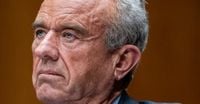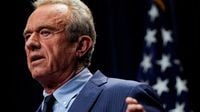In a sweeping overhaul that has sent ripples through the public health community, U.S. Health and Human Services Secretary Robert F. Kennedy Jr. announced on June 11, 2025, the appointment of eight new members to the Centers for Disease Control and Prevention’s (CDC) Advisory Committee on Immunization Practices (ACIP). This move comes just two days after Kennedy removed all 17 sitting members of the committee, citing pervasive conflicts of interest and claiming the previous panel had become a "rubber stamp" for vaccine manufacturers.
The new slate of appointees includes a mix of medical doctors, researchers, and public health experts, some of whom have been vocal critics of COVID-19 vaccines and public health policies during the pandemic. Kennedy described the new members as "highly credentialed scientists, leading public-health experts, and some of America’s most accomplished physicians," emphasizing their commitment to "evidence-based medicine, gold-standard science, and common sense." He assured the public that the reconstituted committee will demand "definitive safety and efficacy data before making any new vaccine recommendations."
The eight new members scheduled to participate in the upcoming ACIP meeting from June 25 to June 27, 2025, are Dr. Robert Malone, Dr. Martin Kulldorff, Dr. Joseph R. Hibbeln, Dr. Retsef Levi, Dr. Cody Meissner, Dr. James Pagano, Dr. Michael A. Ross, and Vicky Pebsworth. This group presents a notable shift in the committee’s makeup, with less emphasis on traditional immunology, virology, and vaccinology expertise and a greater presence of individuals known for questioning vaccine policies and technologies.
Dr. Robert Malone, a biochemist credited with early contributions to mRNA vaccine technology, has become a controversial figure for spreading misinformation during the COVID-19 pandemic. He claimed that many were "hypnotized" into accepting mainstream COVID-19 narratives and has cast doubt on vaccine safety. Similarly, Dr. Martin Kulldorff, a biostatistician and epidemiologist, co-authored the Great Barrington Declaration in October 2020, which called for avoiding lockdowns and pursuing natural herd immunity—a strategy criticized by the World Health Organization’s Director-General as "unethical." Kulldorff was later dismissed from Harvard and Mass General Brigham for refusing COVID-19 vaccination, citing immune deficiency and prior infection.
Dr. Retsef Levi, a professor at MIT, has publicly questioned the safety of mRNA vaccines, tweeting in early 2023 that the "evidence is mounting and indisputable that MRNA vaccines cause serious harm including death, especially among young people," and advocating for an immediate halt to their use. Vicky Pebsworth, a public health nurse and Pacific region director of the National Association of Catholic Nurses, has served on the board of the National Vaccine Information Center, an organization known for promoting vaccine risk awareness and advocating for vaccine exemptions. Pebsworth has cited her son’s "serious, long-term health problems" following routine vaccinations at 15 months as a catalyst for her vaccine safety advocacy.
Other appointees include Dr. Cody Meissner, a pediatric infectious disease specialist with prior service on ACIP and the FDA’s Vaccines and Related Biological Products Advisory Committee. Meissner has been praised by some public health experts for his vaccine expertise, though he has also criticized universal COVID-19 vaccine recommendations for healthy younger populations. Dr. James Pagano, an emergency medicine physician, and Dr. Joseph Hibbeln, a psychiatrist and former acting chief of NIH’s section on nutritional neurosciences, bring additional medical perspectives. Dr. Michael A. Ross, an obstetrics and gynecology professor and healthcare investor, rounds out the panel.
Kennedy’s decision to dismiss the entire previous ACIP panel, many of whom were appointed during the Biden administration, and rapidly replace them with a smaller group has drawn swift and widespread criticism. The American Medical Association (AMA), American Academy of Pediatrics, American College of Physicians, American Association of Immunologists, Infectious Diseases Society of America, and American Nurses Association have all condemned the move. The AMA, meeting in Chicago during the week of the announcement, called for an immediate reversal and a Senate investigation into the decision.
Dr. Paul Offit, a vaccine scientist at the Children’s Hospital of Philadelphia and former ACIP member, lamented the loss of expertise and institutional memory, warning that the new committee includes "two anti-vaccine activists"—Malone and Pebsworth—and could plunge vaccine policy into chaos. Offit expressed concern that the committee’s plan to review the existing immunization schedule could put all vaccines "in play," potentially suspending their use pending further testing.
Financial conflicts of interest, which Kennedy cited as a primary reason for purging the previous panel, have historically been disclosed and managed within ACIP. Members reveal conflicts at the start of meetings and recuse themselves from votes where appropriate. The CDC recently published a searchable database of disclosures from 2000 through 2024 to enhance transparency.
Despite Kennedy's assertion that none of the new members are "ideological anti-vaxxers," many appointees have previously expressed skepticism or criticism of vaccines, particularly COVID-19 vaccines and mRNA technology. This has raised fears among public health officials that the new panel may undermine vaccine confidence and public health efforts.
The ACIP plays a critical role in shaping U.S. vaccine policy, recommending who should receive vaccines and when, which in turn influences insurance coverage and clinical practice. The committee was expected to discuss recommendations for COVID-19 and HPV vaccines at its upcoming meeting. However, with only eight members appointed—short of the 19-member quorum required—the committee will need temporary authorization for additional voting members from other HHS agencies to proceed.
The investment community has also reacted cautiously. Shares of Moderna and Pfizer, producers of mRNA COVID-19 vaccines, fell slightly following the announcement, while Novavax, which produces a non-mRNA vaccine, saw a marginal rise. Analysts have noted that ACIP’s decisions heavily influence vaccine coverage by insurers, meaning changes in committee composition could have significant financial and public health implications.
Since taking office in February 2025, Kennedy has challenged established vaccine policies, removing the FDA’s top vaccine scientist, appointing vaccine skeptics to key positions, and unilaterally changing federal COVID-19 vaccine recommendations, including withdrawing endorsements for healthy children and pregnant women. His actions reflect a broader agenda to reshape vaccine policy, one that has alarmed many in the medical and scientific communities.
As the reconstituted ACIP prepares to convene in late June, the nation watches closely. The committee’s decisions will not only affect vaccine recommendations but could also influence public trust in vaccines during a time when vaccine-preventable diseases remain a significant threat. The coming weeks will be critical in determining the future direction of U.S. immunization policy under Secretary Kennedy’s leadership.





